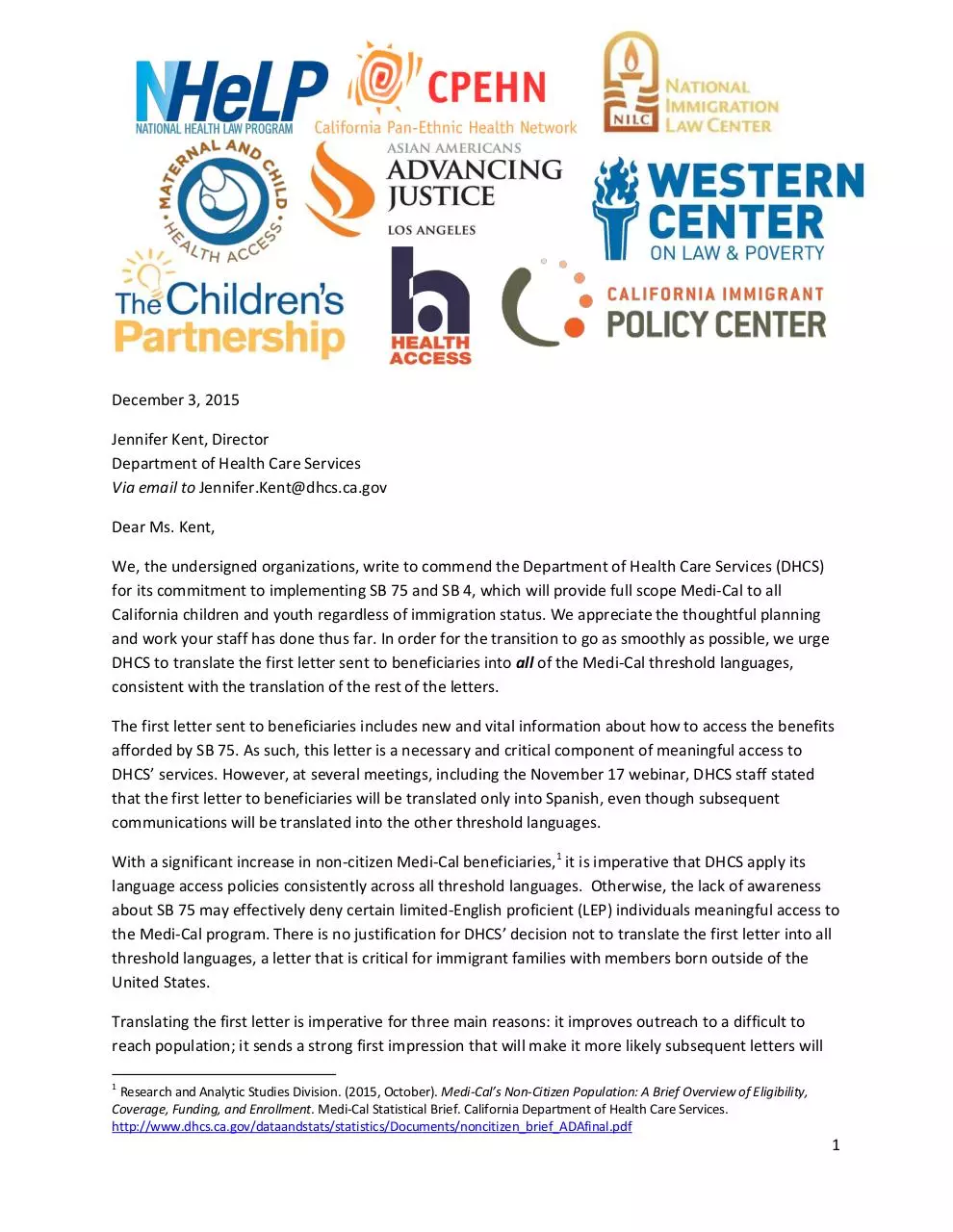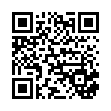Translating SB75 letters (for May 2016) (1) (PDF)
File information
Author: Cori Racela
This PDF 1.5 document has been generated by Microsoft® Word 2010, and has been sent on pdf-archive.com on 31/05/2016 at 21:14, from IP address 50.76.x.x.
The current document download page has been viewed 411 times.
File size: 463.02 KB (3 pages).
Privacy: public file



File preview
December 3, 2015
Jennifer Kent, Director
Department of Health Care Services
Via email to Jennifer.Kent@dhcs.ca.gov
Dear Ms. Kent,
We, the undersigned organizations, write to commend the Department of Health Care Services (DHCS)
for its commitment to implementing SB 75 and SB 4, which will provide full scope Medi-Cal to all
California children and youth regardless of immigration status. We appreciate the thoughtful planning
and work your staff has done thus far. In order for the transition to go as smoothly as possible, we urge
DHCS to translate the first letter sent to beneficiaries into all of the Medi-Cal threshold languages,
consistent with the translation of the rest of the letters.
The first letter sent to beneficiaries includes new and vital information about how to access the benefits
afforded by SB 75. As such, this letter is a necessary and critical component of meaningful access to
DHCS’ services. However, at several meetings, including the November 17 webinar, DHCS staff stated
that the first letter to beneficiaries will be translated only into Spanish, even though subsequent
communications will be translated into the other threshold languages.
With a significant increase in non-citizen Medi-Cal beneficiaries,1 it is imperative that DHCS apply its
language access policies consistently across all threshold languages. Otherwise, the lack of awareness
about SB 75 may effectively deny certain limited-English proficient (LEP) individuals meaningful access to
the Medi-Cal program. There is no justification for DHCS’ decision not to translate the first letter into all
threshold languages, a letter that is critical for immigrant families with members born outside of the
United States.
Translating the first letter is imperative for three main reasons: it improves outreach to a difficult to
reach population; it sends a strong first impression that will make it more likely subsequent letters will
1
Research and Analytic Studies Division. (2015, October). Medi-Cal’s Non-Citizen Population: A Brief Overview of Eligibility,
Coverage, Funding, and Enrollment. Medi-Cal Statistical Brief. California Department of Health Care Services.
http://www.dhcs.ca.gov/dataandstats/statistics/Documents/noncitizen_brief_ADAfinal.pdf
1
be opened, including the critical managed care packet; and it avoids an impermissible distinction
between the threshold languages.
In order to fulfill the promise of SB 75—to provide coverage for all low-income children—DHCS and its
community partners must make headway with enrolling a historically hard to reach and vulnerable
population. Providing translated vital documents in threshold languages is the most efficient way to do
so because undocumented immigrants are far more likely to speak a non-English language than are
other California residents.2 The SB 75 target demographic also may not have access to information
channels on which DHCS normally relies. Without proper translation, many LEP beneficiaries may not
understand the content of the letter or may end up disregarding the notice altogether without realizing
its importance.
DHCS staff has suggested that including translated taglines in the letter is sufficient to inform LEP
beneficiaries of the opportunity to get full scope coverage under SB 75. We firmly believe taglines would
not be proper notice to the LEP beneficiaries and would be wholly inadequate for this initiative. In our
experience taglines often fail to convey the urgency of a notice. Additionally, requiring the recipients of
this letter to take an extra step to understand its contents is a barrier, not an invitation, to learning more
about their children’s potential eligibility. For understandable reasons, undocumented immigrants may
be fearful about reaching out to a government entity to get more information about the program. We
also know that many undocumented immigrants may be reluctant and even fearful to sign their children
up for full-scope Medi-Cal, including fear of jeopardizing their ability to obtain lawful permanent
residence in the future for becoming a “public charge” or being reported to the Department of
Homeland Security and deported. A letter translated into the recipient’s preferred language goes a long
way to convey that full scope Medi-Cal and DHCS is open to all immigrant communities, regardless of
language or national origin.
Our experience working directly with Medi-Cal beneficiaries and immigrant families and the lessons
learned from the Low Income Health Program (LIHP) transition informs our strong belief that the first
letter is a critical opportunity to share important information about the transition to full-scope Medi-Cal.
As such we believe that translating this initial communication into all Medi-Cal threshold languages, as it
was done during the LIHP transition, is essential.
From our own outreach and education work, we have also found that word-of-mouth is one of the most
effective ways of informing immigrant communities about public benefits, especially when programs
change. Providing a translation allows the recipient to show the letter to friends or trusted community
members to gather more information. It also allows beneficiaries to share information with other
eligible families who may not yet be known to the Medi-Cal system and would benefit from this
program. Translations into all threshold languages will also allow community based organizations that
work with non-English, non-Spanish language communities to access and share copies of the letter with
families who may have eligible children. We have found when working with immigrant families, that
2
According to the Public Policy Institute of California, most undocumented immigrants are from Latin America. Most of the
others are from Asia—though Europe, Canada, and Africa account for hundreds of thousands of undocumented
immigrants in the United States. See http://www.ppic.org/main/publication_show.asp?i=818
2
when outreach and informational materials are only translated in Spanish, immigrant families often
think that certain opportunities are only for Latinos. This was the case during outreach efforts for AB 60
Driver’s License implementation.
Finally, if DHCS were to translate the letter into Spanish only, it would be making an impermissible
distinction between threshold languages. Providing language access is a requirement for all non-English
languages, but a threshold language, once determined, should be afforded translations of vital
documents. See 68 Fed. Reg. 47319. Once the numerical threshold is met, the language used by that
threshold population is not subject to further scrutiny and should not be afforded lesser treatment. The
numerical distinctions are for threshold and non-threshold languages, not for ranking or prioritizing
among the thresholds. DHCS may not discriminate among different national origin groups. See 42 U.S.C.
§ 2000d; 42 U.S.C. § 18116; Gov. Code § 11135. Because the Medi-Cal threshold languages have already
been determined, DHCS should employ translations for all 11 non-English written languages.
We would appreciate the opportunity to discuss our comments with you. Please contact Cori Racela at
(310) 736-1646 or racela@healthlaw.org or Gabrielle Lessard at (213) 639-3900or Lessard@nilc.org at
your earliest convenience.
Sincerely,
Asian Americans Advancing Justice
California Immigrant Policy Center
California Pan-Ethnic Health Network
The Children’s Partnership
Health Access
Maternal and Child Health Access
National Health Law Program
National Immigration Law Center
Western Center on Law & Poverty
cc via email to:
Senator Ed Hernandez, Chair, Senate Health Committee
Assemblymember Rob Bonta, Chair, Assembly Health Committee
Senator Holly Mitchell, Chair, Senate Budget Subcommittee No. 3
Assemblymember Tony Thurmond, Chair, Assembly Budget Subcommittee No. 2
Senator Ricardo Lara
René Mollow, Department of Health Care Services
Harold Higgins, Department of Health Care Services
John Zapata, Department of Health Care Services
3
Download Translating SB75 letters (for May 2016) (1)
Translating SB75 letters (for May 2016) (1).pdf (PDF, 463.02 KB)
Download PDF
Share this file on social networks
Link to this page
Permanent link
Use the permanent link to the download page to share your document on Facebook, Twitter, LinkedIn, or directly with a contact by e-Mail, Messenger, Whatsapp, Line..
Short link
Use the short link to share your document on Twitter or by text message (SMS)
HTML Code
Copy the following HTML code to share your document on a Website or Blog
QR Code to this page

This file has been shared publicly by a user of PDF Archive.
Document ID: 0000378795.